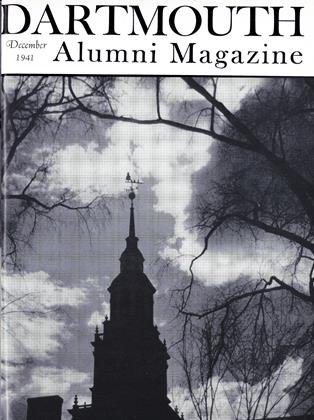THE RATE OF GROWTH AND THE YOUTHFULNESS of the alumni body may provide surprising information. In the reports of the Alumni Council meetings last month that are carried in the CollegeNews section of this issue, this data is shown to have played an important part in the selection of new trustees of the College. In his talk to the Council President Hopkins revealed that the mid-point of the alumni body falls within the class of 1928. Present representation on the Board of Trustees, he said, is limited to 20% of the alumni. With no member of the Board younger than the class of 1916 there is no direct part taken in the important affairs of the Corporation by 80% of Dartmouth men.
President Hopkins asked the Alumni Council to select at this time nominees for existing trustee vacancies who are less than 25 years out of College. To follow this policy means that some exceedingly well qualified men of from 25 to 40 or more years out of college, are not available. The President fully acknowledged this unsatisfactory situation and spoke with regret of the loss to the College that is inherent in the policy.
However, there is another factor in the problem that was justly emphasized in the report to the Council of Mr. Wilkins' nominating committee. Of the present eight members of the Board whose terms of office have some years to run, seven are of the age group from the class of 1901 to 1907 inclusive. It is probable that there will be replacements of these seven members within a short period, sometime in the future. The selection of younger men now, to be available during such a period of change in the membership of the Board, is sound policy.
Harvey P. Hood II '18 of Boston and Dudley W. Orr '29 of Concord, N. H., are the nominees of the Alumni Council to fill vacancies on the Board of Trustees. Our congratulations to them upon their selection. They are admirably qualified for the positions of great responsibility which they have willingly accepted. They exemplify the talent among the younger alumni that is available to add strength to the Board and also to give representation on it of the younger classes of large numbers. Announcement of a nomination for a third vacancy will be made by the Council later in the year.
In this discussion of the President's desire to have younger men brought into positions of greatest importance in College and alumni affairs it is pertinent to recall that President Hopkins was himself only 15 years out of College when he was elected to head the institution. As much as Dartmouth needs, and must rely upon, the guidance and work of men of full maturity, it is vital to the future not to overlook the strength that can be contributed in many ways by younger men.
 View Full Issue
View Full Issue
More From This Issue
-
 Article
ArticleSocial Idealism in College
December 1941 By ARTHUR E. JENSEN -
 Sports
SportsBig Green Teams
December 1941 By Frank Hall '41 -
 Article
ArticleRediscovering the College Seal
December 1941 By RAY NASH -
 Class Notes
Class Notes1937*
December 1941 By DONALD C. MCKINLAY, ARTHUR H. RUGGLES JR. -
 Class Notes
Class Notes1912*
December 1941 By CONRAD E. SNOW, RICHARD C. PLUMER -
 Class Notes
Class Notes1919*
December 1941 By WINDSOR C. BATCHELDER, MAX A. NORTON







